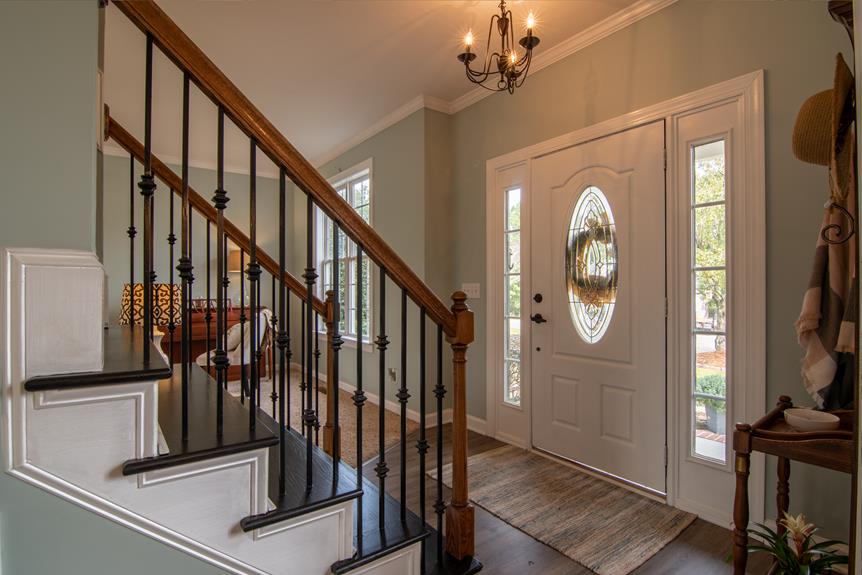Government Steps for Home Energy Preservation
Looking to make your home more energy-efficient? The government has taken steps to help you preserve energy and save money. With tax incentives for upgrades, mandatory audits, and rebates for solar panels and efficient appliances, they’re making it easier for you to make a positive impact on the environment.
Plus, building codes are now requiring energy-efficient construction, and public awareness campaigns are promoting conservation. Join the movement and be a part of the solution for a greener future.
Tax Incentives for Energy-Efficient Upgrades
Take advantage of tax incentives to save money on energy-efficient upgrades for your home. Financing options are available to help make these upgrades more affordable.
The government encourages homeowners to invest in green building practices by offering tax incentives as a reward. These incentives can help offset the costs of installing energy-efficient appliances, windows, insulation, and other upgrades that reduce energy consumption.
By taking advantage of these incentives, not only will you be saving money on your energy bills, but you’ll also be contributing to a more sustainable future.
It’s important to do your research and understand the specific tax incentives available in your area. Consult with a tax professional or visit government websites to learn more about the financing options and incentives that can help you make your home more energy-efficient.
Mandatory Energy Audits for Residential Properties
Schedule a mandatory energy audit for your residential property to assess its energy efficiency. An energy audit is a comprehensive assessment of your home’s energy usage, identifying areas where energy is being wasted and providing recommendations for improvement.
Here are some benefits of getting an energy audit:
- Cost savings: By identifying and addressing energy inefficiencies, you can significantly reduce your energy bills.
- Increased comfort: An energy audit can help identify and fix issues such as drafts, uneven temperatures, and poor insulation, ensuring a more comfortable living environment.
- Environmental impact: By reducing energy waste, you’ll be contributing to a greener and more sustainable future.
- Home value: An energy-efficient home is more attractive to potential buyers, increasing its resale value.
The energy audit process typically involves a professional conducting a thorough inspection of your property, analyzing energy bills, and using specialized equipment to identify energy-saving opportunities. It’s a valuable step towards making your home more energy-efficient and saving money in the long run.
Rebates for Installing Solar Panels and Energy-Efficient Appliances
To maximize your savings and contribute to a greener future, consider taking advantage of government rebates for installing solar panels and energy-efficient appliances in your home.
Installing solar panels provides numerous benefits, such as reducing your reliance on traditional energy sources and lowering your monthly electricity bills. By harnessing the power of the sun, you can generate your own clean and renewable energy.
Additionally, the government offers rebates for installing energy-efficient appliances, such as refrigerators, air conditioners, and washing machines. These appliances are designed to consume less energy while still providing the same level of performance.
By replacing your old, energy-guzzling appliances with energy-efficient ones, you can significantly reduce your energy consumption and save money on your utility bills. Take advantage of these rebates today and start enjoying the benefits of solar panels and energy-efficient appliances.
Building Codes Requiring Energy-Efficient Construction
When installing solar panels and energy-efficient appliances in your home, it’s important to be aware of building codes that require energy-efficient construction. These codes aim to promote sustainability and reduce energy consumption in buildings. Here are four important aspects of building codes that focus on energy efficiency:
- Building materials: Codes may require the use of energy-efficient building materials, such as insulation with high R-values and windows with low U-values, to minimize heat transfer and maintain a comfortable indoor temperature.
- Energy-efficient design: Codes may mandate the incorporation of energy-efficient design principles, such as proper orientation, natural lighting, and ventilation systems, to reduce the need for artificial lighting and cooling.
- Insulation standards: Codes may establish minimum insulation requirements for walls, roofs, and floors to prevent heat loss or gain, resulting in lower energy usage for heating and cooling.
- System efficiency: Codes may require the installation of energy-efficient heating, ventilation, and air conditioning (HVAC) systems, as well as lighting fixtures and appliances that meet specific energy efficiency standards.
Public Awareness Campaigns Promoting Energy Conservation
How can you actively participate in public awareness campaigns promoting energy conservation? By adopting energy-saving habits and engaging with your community, you can make a significant impact on promoting energy conservation.
Start by implementing simple practices such as turning off lights and appliances when not in use, using energy-efficient light bulbs, and adjusting your thermostat to conserve energy. Additionally, you can actively engage with your community by organizing or participating in local events focused on energy conservation.
Share your knowledge and experiences with others, encouraging them to adopt energy-saving habits as well. By working together, we can create a culture of energy conservation and make a positive impact on the environment.
Join the movement and be a catalyst for change in your community.
Conclusion
You’ve made it to the end! By now, you’ve learned about the government’s steps to preserve home energy. From tax incentives for energy-efficient upgrades to mandatory energy audits, these measures aim to make our homes more sustainable.
With rebates for solar panels and energy-efficient appliances, and building codes promoting energy-efficient construction, we’re heading towards a greener future. Public awareness campaigns are also in place to spread the word on energy conservation.
So, let’s all join hands in preserving energy and creating a brighter tomorrow!





